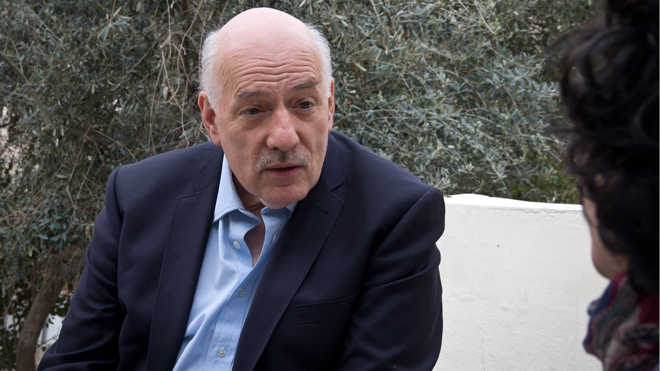By Sara Obeidat, photo by Hussam Da’anah
With the growing disillusionment in the Arab Spring and the democratic change it had promised to bring, and with dictators battling at the front line for political dominance, encouraging political participation and creating channels for political thought and criticism are as important as ever. “People in the region are fed up, and as a result many people would trade freedom for stability, they would trade it for prosperity, and they would trade it for protection. That is an invitation for any dictator to come and offer those three things. “ says Tim Sebastian, award-winning television journalist and founder of the New Arab Debates.
Sebastian began the New Arab Debates in 2011, as uprisings in the Arab world began to take place. Having organized the Doha Debates year after year since 2004 in Qatar, he decided to host the Doha Debate in Tunisia only three weeks after Ben Ali had left the country. “We decided to go to places where things were happening, and nothing was happening in Qatar.” He then launched the New Arab Debates in Tunisia, Egypt, Jordan, and will take them to the West Bank for the first time this year. Sebastian emphasizes how important it is for these debates to operate under a zero censorship policy, which limits the number of countries where the debates can take place.
In an increasingly polarized yet also increasingly disengaged region, safeguarding and promoting the culture of debate is both needed and difficult. “We can no longer operate in Egypt,” said Sebastian, “because we are not allowed to engage with the Muslim Brotherhood, who represent a substantial number of the Egyptian population, in any of our debates.” After the Egyptian government declared the Muslim Brotherhood a “terrorist organization”, Sebastian saw no point in taking the debates to Egypt, considering that the tone of the conversation would be predetermined through such regulations.
This week, the New Arab Debates are coming to Amman with the motion “The Arab World is No Place for Women.” Various recent reports on the status of gender in the Arab world have been fairly damning of the region in their findings, says Sebastian, citing the World Economic Forum’s 2013 report on Gender Equality as an example.
Free speech is an enabling right, which is why it is the first thing that dictators seek to extinguish.
Sebastian explains that the goals of these debates are primarily to get people to listen to one another, and encourage citizens to play an active role in political life, rather than view politics as a spectator sport in their country’s political arena. Another goal Sebastian hopes the debates will achieve is to push people to “hold their leaders to account and ask them the right questions.” Very often in these debates, political figures have been present both on stage and in the audience, and have heard what the public has to say. When asked about his hopes for the outcome of the debates in Jordan, Sebastian said he hopes to be able to hear different points of view. “I do not care which side you pick, as long as you actually pick one.”
However, as political realities become more complex and grey in the region, particularly in a place like Syria which has played a role in slowing down the region’s overall momentum for change, the idea of picking a side has become a challenge for many. In addition, picking a side amidst all existing political complexities is perhaps what cements the polarization.
Sebastian disagrees with this notion; he says that despite the increased polarization in this region, picking a side and engaging in debate allows the mind to focus. “When you vote in an election, you will need to pick one candidate over the other. So just pick one, you do not have to stick to it your entire life, but pick one. This is all part of the political process.”
Whether or not this is the case, the New Arab Debates currently taking place in Jordan will give the audience a platform to express their views on the issue of gender equality in the region. A previous debate in Amman discussed whether or not Jordan was on the brink of political turmoil and unrest. Another tackled the amendments to the Press and Publication Law and the restrictions they posed on press freedom.
“Free speech is an enabling right, which is why it is the first thing that dictators seek to extinguish.” Sebastian therefore views these debates as part of the continuous and ongoing battle for free speech, which he says are taking place all over the world in different forms.
The New Arab Debate takes place tonight Thursday March 20th, at the Royal Cultural Center at 7pm, to be moderated by Egyptian TV presenter Mai El Sherbiny.
